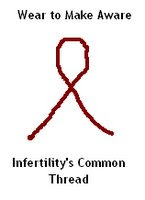I've been spending some free time watching shows that I've wanted to see on Netflix and reading lots of books the past few weeks. I've begun to notice something about what I've been watching and reading. Infertility has become the new black.
It seems that most, not all just most that I've seen lately, shows feel obligated to have at least one character deal with infertility. It seems to be the same things with books as well. It used to be a deadly disease. Now it's infertility testing, surrogates, and adoption. Now, bringing this to the public is wonderful. I applaud that it's becoming a mainstream plot point, but sometimes I really want to escape from it myself. How does one escape their reality when TV is showing it and makes it look like it's so easy to resolve? People meet birth moms at a coffee cart, find a surrogate on a softball team, try to conceive for 3 months and go off for testing, only to find that all is well and then conceive 2 months later.
It's wonderful and heart-breaking all at the same time. Very rarely does the show actually show the pain and heartache associated with infertility. It doesn't reflect the costs and legalities involved with treatments, adoption, and surrogacy. It's just a nifty new plot twist designed to tug at a few hearts and then get quickly resolved.
It's also occurring more and more in books, usually resolved by the end with a miracle pregnancy or no problem adoption. It's frustrating and frankly demeaning to those of us who are struggling with these issues on a daily basis. We all want that happy ending, that miracle pregnancy, that happy adoption. But it isn't easy and it certainly isn't usually resolved in a quick or timely manner.
I wish that producers and writers actually understood and actually dealt with the problems in at least a realistic manner. It would do so much to further our cause and actually help educate people. We as infertile people do what we can to further the cause only to be set back by these portrayals that others take as gospel. It's frustrating, but true. Infertility has become the new black.
1072nd Friday Blog Roundup
6 hours ago








